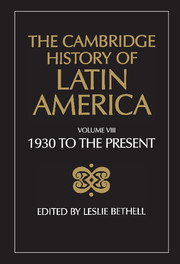8 - Peru since 1960
from PART THREE - PERU AND BOLIVIA
Published online by Cambridge University Press: 28 March 2008
Summary
Peru after 1960 experienced significant changes in its social structure, a notable expansion and intensification of political participation and important advances in the national integration of the peasants, as well as the urban middle and working classes, which were traditionally characterized by fragmentation and a marginal political status. At the same time, Peru underwent a series of changes in its political regime, shifting from an oligarchic system to a relatively broad-based democratic polity. Yet the relations between state and society acquired a conflictive character in so far as political ‘inclusion’ was accompanied by ‘exclusionary’ policies in the socio-economic arena which impeded the democratization and nationalization of Peruvian society and politics. The resulting tension produced a high level of political conflict and violence, contributing to the disintegration of the state.
After the Second World War, Peru had experienced a short period of democratic transition that ended in 1948 with a military coup headed by General Manuel A. Odría. The Odría dictatorship (1948–56) paved the way for increased participation by U.S. capital in the economy as a result of which traditional exports expanded and high rates of growth in gross domestic product (GDP) were achieved. (During the period from 1950 to 1967, exports grew 7 per cent annually — as against 4 per cent in Latin America as a whole — and GDP rose 6 per cent annually. In 1965, 47 per cent of the country's exports were produced by U.S. corporations, and 62 per cent of the financial capital was controlled by U.S. banks.)
- Type
- Chapter
- Information
- The Cambridge History of Latin America , pp. 451 - 508Publisher: Cambridge University PressPrint publication year: 1991
References
- 23
- Cited by



